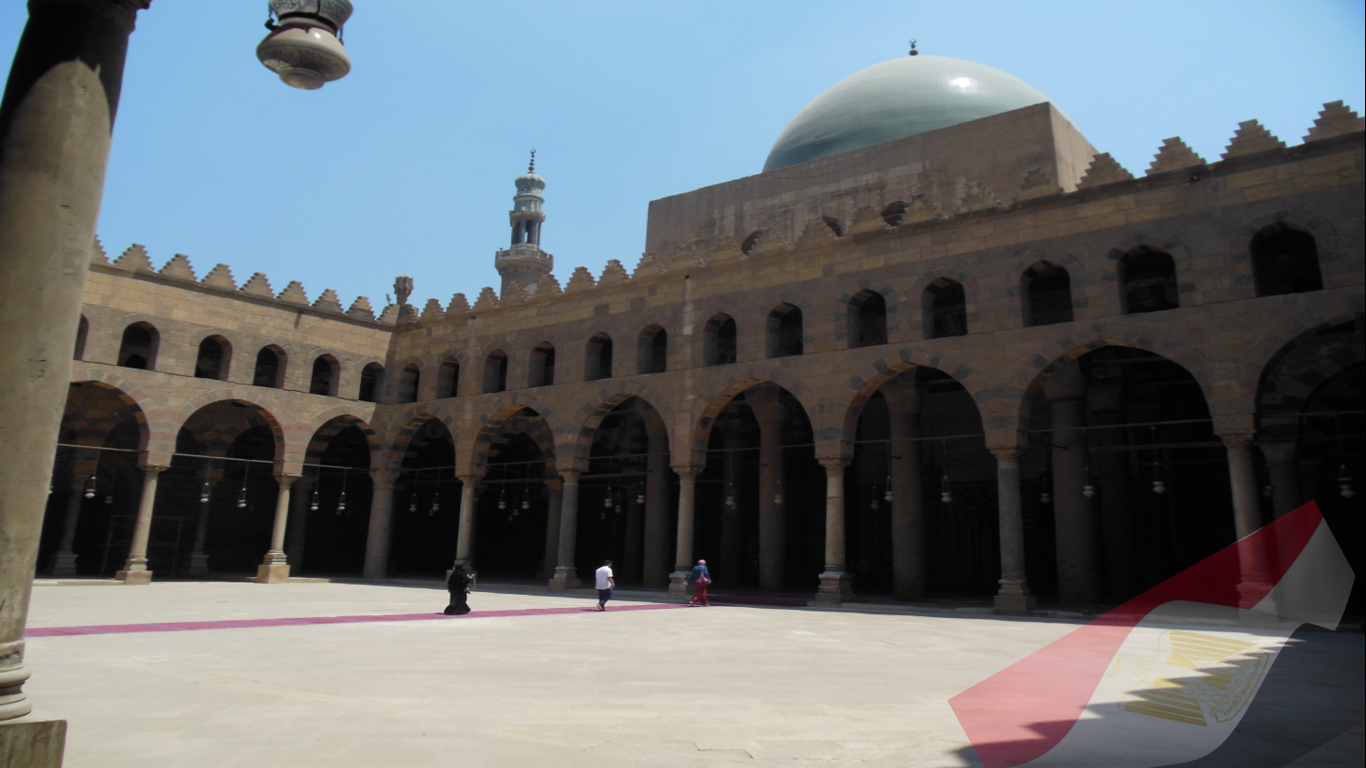Not doubt what happened this week in Beirut not only deserves our undivided attention, but it also put the Middle East back to the headlines. And in a level unseen since the war on Syria, or the so-called “Arab Spring”.
What happened, especially that there are good quality videos about it, is indeed so shocking that it borders the realm of believable. And the details behind the accident, which started to poor in very fast are giving out a story of unbelievable negligence, nepotism, and carelessness. Especially the negligence and the corruption which allowed it to exist led many to say that this is the true testimony of the Middle East and the Arab states, and that is exactly why they need to be kept under control. Because if such a tragedy could have happened in one of the most developed Arab states, what can be expected from the worsts? These opinions totally disregard that Western governments are not any less irresponsible and there are hair raising stories of negligence in the “developed world” as well, but indeed the incident suddenly revealed all the chronic problems of Lebanon. And that happened in a country which last year reached a total political deadlock, massive protests toppling the government – under still suspicious circumstances -, the state announced bankruptcy and the austerity measures – which are not even part of the consolidation – are worse than in Greece a few years ago, and on top of that was hit by the Corona epidemic. While the government was coping with these extreme conditions, the pressure only grew with sanctions of Syria on one and hand, and with the Turkish-Saudi rivalry for influence in the other.
Since the explosion the reactions are harsh. President ‘Awn promised swift investigation and justice, Ḥizb Allah suggested the army should investigate as the only institution baring the trust of the people, while others suggested foreign intervention. That, however, seems to matter less for the street understandably angry at this point, and the confrontations on Saturday night already brought Prime Minister Ḥassān Diyāb to the decision to organize new elections. With this, the government, which held firm in the last nine months and tried hard to keep Lebanon afloat, so to avoid total economic and social meltdown might end up dead. Meaning the results of the explosion might the collapse of Lebanon.
This, however, is not a story of one careless incident, or a ridiculous example of corruption. Only by understanding the inner system of Lebanon, which truly reached its end and the people are not able to tolerate it any longer, can someone understand that such a catastrophe was only a matter of time. As soon as it happened, as nothing has even changed from the day before, political squabbling went on. Some immediately saw Ḥizb Allah and Iran behind it, some the Israelis, the Americans, or some other, and the accusations went on, some even willing to give up the very basics of national sovereignty.
What happened in Lebanon is not about the explosion and the death of more than 158 people. It is about the legendary Lebanese sectarian democracy, which made such a disaster something very expected.
What happened?
Before we go into any details it must be pointed out that so far very little is certain. Indeed there is a boom of articles and assessments on the events all proving the “true” answers, most of this comes within the framework of internal and eternal Lebanese disputes and the contradictions of the foreign powers all supporting some Lebanese groups. Therefore first we put down what is known and what can be proven, and only after we point out the most circulated answers. Of course, not forgetting the interests behind these versions.
What is know that on Tuesday afternoon 4 August 2020, around 5 p.m. local time one of the main warehouses in Beirut port got on fire, allegedly storing pyrotechnic material. Firefighters were scrambled to the scene and some steps were taken to stop the catastrophe. Either the fire went on to the neighboring building, or it blew up, which caused severe damage to the neighboring warehouse. That is the “first explosion” many witnesses reported, and which caught the attention of many Beirut residents. By then the first warehouse was severely on fire, while the other as well started to flare up. Some of the videos show random small flares, minor explosions in the fire, and the smoke, which confirms that pyrotechnical material caught on fire.
Only seconds after the first explosion came the second. 2750 tons of ammonium nitrate blew up the neighboring or the same warehouse, and that devastated Beirut. The statistics of Saturday night state at least 158 dead, 6000 injured and at least one-third of Beirut’s homes became partially or completely unlivable. Since then some 15 people were arrested, but understandably these are the small fishes no one cares about because the real reason goes much much higher.


The blast was so massive that in Cyprus authorities suspected earthquake, just like in many parts of Lebanon, and the smoke was witnessed even in Damascus suburbs some 85 kilometers away. The blast made Beirut port unsuitable for transport for some time, devastated the downtown famously full of night life, destroyed the central grain silo, the tall building next to the fire on the footages, leaving Lebanon with grain enough for one month and caused indescribable damage in homes. Thus leaving Lebanon dependent on the ports of Tripoli and Sidon, none of them capable to take over from Beirut, one foreign aid, which was already a practical – though unconfessed – a reality for a month. Lebanon almost became a failed state.
The sequence of the events is very important because the relative big number of amateur, though good quality videos on the explosion already triggered several conspiracy theories, as it was a staged event. That might be, but because the initial fire of the pyrotechnics went on for some time before the explosion and with great smoke, it is perfectly logical that several videos were shut on it. Also, there have been many videos showing drones, missiles, airplanes, and other objects causing the – the second, so fatal – explosion, which so far all turned out to be hoaxes. That is so because the videos prove that the fatal explosion was caused by the first, minor one, which was caused by the fire. Now, what caused the warehouse fire is indeed a sensitive topic and here foul play cannot be excluded at all. However, the explosion was not caused by an enemy missile.
What could have happened has many readings and suggestions and a matter of important debate, but some details should be clarified here. Because even if an enemy party is responsible for the tragedy, after all, the undeniable fact is that 2750 tons of highly explosive ammonium nitrate caused the catastrophe, which was stored by Lebanese authorities. That cargo was there for years, with the full knowledge of the authorities, some even warned the government the tragedy is imminent, and also Lebanese authorities stored tons of pyrotechnic materials in the vicinity. The “enemy” might be responsible, but the main blame falls of the Lebanese state allowing such conditions. That is the inescapable reality. This is what many want to escape by putting the blame on certain factions, and that is what the street is saying very angrily now to the government. Ironically uniting the people, which rarely ever happened on such a scale since the independence of Lebanon, but very much needed in such a crisis.
But before we go into the foreign implications, as many parties tried to exploit the scene very aggressively and this fuel most of the politically motivated explanations, we also have to see how such a time bomb could have been ticking for years. Because these details also deny some legends about the tragedy, while explaining others, even if they don’t verify them.
The most logical question is how come that 2750 tons of explosives were stored in a warehouse practically in the middle of Beirut. Shockingly that is a very old and well-detailed story, the case of the cargo vessel MV Rhosus, which carried the ammonium nitrate. The originally Japanese built ship saw many owners, until it was finally flagged Moldovan and bought by a certain Igor Grechushkin, a Russian citizen living in Cyprus. Contrary to many claims he does not have Cypriot citizenship. In September 2013 the ship loaded the 2750 tons of ammonium in Georgia to deliver it to Mozambique. Sources contradict why, but the MV Rhosus ported Beirut in late November 2013, and authorities found it unseaworthy. The crew was arrested, though some got released soon. The owner company almost immediately filed bankruptcy, and after a short while, creditors started a long legal battle both for the ship and the cargo. Sometime in 2014, the cargo was brought to the closest warehouse in fear that the ship would sink, which ironically happened in 2018. So the matter was long and very clear for years. Several things, however, have to be pointed out here. First of all the cargo. Ammonium nitrate is relatively stabile salt primarily used for fertilizers or explosives. The claim of the Lebanese authorities that the confiscated cargo is on its own not dangerous is true, because while ammonium nitrate is used for explosives, never on its own. Alone this material needs extreme heat to blow up, which in this case was the high amount of fireworks. Strangely, while the details of ammonium nitrate are well documented, the origin of the pyrotechnics are less clear. Though the real problem was here, and in the negligent storage of both cargoes so close to each other.
The other important thing is that there are many obscurities about the cargo, its arrival to Lebanon, and the Russian owner Grechushkin. First of all, even after the explosion, Grechushkin was only questioned by Cypriots authorities by Lebanese demand, and he was never charged with anything. By all sufficient data, the ship was indeed heading for Mozambique, but there are many legends about its arrival to Beirut. Some claim that it was a cargo meant for Ḥizb Allah to create weapons against Israel. Other suggest that the cargo was under the supervision of Ašraf Rīfī, head of Lebanese internal security at the time, who was close to Sa‘ad al-Ḥarīrī supporting the terrorist factions in Syria. According to this version the explosives were to be smuggled to the terrorist groups in Syria to carry out bombings, only it never reached its target. There are other theories as well, but these are the two main ones.
Focusing on that two, Ḥizb Allah for long is interested in precision missiles against Israel, which by their confession they have, therefore the ammonium nitrate in such a quantity wouldn’t have been needed. Anyways in 2014, Ḥizb Allah was heavily engaged in Syria giving support to the Syrian army utilizing its guerrilla experience, and indeed we don’t see any evidence that such bombs were used in Syria by the Lebanese resistance. On the other hand, such delivery for the terrorists would have been logical, as they still rely heavily on the use of bombs and mass bombing massacres. But was the head of the internal security involved in the smuggling operation and with such political backing it is unexplainable why was it abandoned for years completely. It must be pointed out that there are many interesting puzzles and convincing half-answers, but there is just not one complete story without plot holes.
Whichever way the ammonium nitrate arrived to Beirut and got stashed in the first warehouse, it is almost unbelievable that altogether six years went by. The authorities stopped the ship warning that it will sink, which it did in Beirut port, and they also warned that the cargo might eventually blow up, which it did. And no one did anything. That goes way beyond simple negligence. That is due to the infamous Lebanese sectarian corruption, by now paralyzing the state like cancer. This has to be overviewed to understand what really caused this tragedy, and why the Lebanese people cannot regard it as an incident, much rather the collapse of the state.
The prime model of democracy
Though almost all Western assessments claim that Israel is the only democracy in the Middle East, Lebanon, along with some states like Kuwait, does show very good examples of Western democratic standards. So good in fact that even its corrosive shortcomings are perfectly copied and developed even further. Lebanon is the prime example of a democratic model in a highly fractured and polarized society, in which the rights and interests of every social component are secured. And that causes the problem now.
When after the First World War France occupied Lebanon and Syria, and took them as its mandates – a term very important today – it had a special interest for Lebanon. Which now French politics call “the spoiled child”. For centuries the French state was – and still is – the guardian of the Lebanese Maronite Church, possibly the biggest and definitely the most influential Christian denominations in the Levente at that time. France for long wanted to take over the part of the world, and in 1920 it finally succeeded, but the so-called “Greater Lebanon”, what we have today and created by the French was bigger than the Lebanese Christian minority. One reason was to make the state more viable economically, but also to keep influence over the Lebanese, leaving them divided. The result was the Sunnis wanted a merger with Syria and opposed the very existence of the state, the Druze wanted a state for themselves with their brothers in Syria and Palestine, while the Maronite wanted to get rid of regions and were squabbling with other, smaller churches. To solve this an agreement was reached between the factions suggested in the 1926 constitution, and then codified in the National Pact of 1943. Under this agreement, Lebanon would be a Christian lead state, in which the Christians accept an Arab orientation and don’t seek Western guidance, while Muslims accept the existence of Lebanon and don’t pursue unity with Syria. The state was to be presidential and the power-sharing was guaranteed as the President has to be a Maronite Christian, the Prime Minister a Sunni, the Speaker of the House a Shia. Furthermore, all public functions and offices were to be divided in a 6:5 ration in favor of the Christians. In time, however, minority ratios and realities changed.
At the end of the Civil war the agreement signed in aṭ-Ṭā’if between the different parties kept this system, but changed the equation to 5:5 return between Muslims and Christians, the state was changed to parliamentary lead by the Prime Minister, in which the President is not directly elected anymore, and all 17 religious minorities got veto power over major decisions. The war, the liberation from Israel only finished in 2000 and the economic boom caused by massive investments and reconstructions overshadowed the reality that the new deal sealed the faith of a paralyzed state.
In this political system, every party is clearly sectarian, which does not have to be this way, but that is the traditional reality. Ideological differences naturally exist, but such party-ideological loyalties never surpass the sectarian ones. In a result, no political party can achieve a majority, and any government has to be a coalition. But because the other sectarian parties also have a big influence, their agreement is needed for a big decision. Like electing a President, which between 2014 and 2016 for two years couldn’t be agreed upon. The answer is either to take the other parties into the government, as well or to secure other institutions to them. In this system, every faction, and the extremely rich political class leading them took hold over several institutions, practically as a fiefdom. The only relative exception is the army, which is still somewhat mixed and trusted. The institutions don’t primarily serve the population anymore, but became power bases for factions, or families within the factions. But since everyone is involved, no one really complained. Until the first shocking examples came. However, the system inherently secures that it cannot be repaired. If in a given institution corruption and mismanagement is rampart, investigation can hardly be run against it. Because the investigating body either belongs to the same faction, in which case no result can be expected, an allied faction and the result is the same, or a rival faction, in which case the investigation automatically turns into a political struggle. On top of that, every faction has at least one, some more, foreign supporter, who also intervene. So even if a government miraculously could clamp down of one corrupt group, and could overcome the faction(s) begins it, the foreign power behind them intervene.
The result is dual. First of all, every state institution is primarily selfish and unaccountable. And as such, inefficient and corrupt. Secondly, any political fight automatically takes a regional dimension and visa versa. So change not only have to come from below with almost complete agreement, but also with regional consent. And that is an illusion. That system was drifting for very long years and practical states were born within the state until the meltdown came last year. Which, as we discussed, was primarily foreign motivated, but was just as much coded into the system, as the explosion this week in the port.
The benefit of this segmented state would be that every institution, has its “overlord”, who in such calamities could be held accountable exclusively. But because the system itself is so rampantly corrupt, it is easy to evade such accountability by venting the fury on the other factions, saying: “Yes, yes! But look at them! They are even worse!” That is why no investigation ever reached the result, and why it is not surprising to see that the very Sa‘ad al-Ḥarīrī, who was the PM at the economic collapse for three years and whose fiefdom the Beirut port is, was amongst the first to visit the site and exploiting the scene. Of course, he kept fair distance from the people.
The vultures
It is not surprising at all that right after the incident the foreign powers already squabbling for their influence over Lebanon arrived almost immediately to show themselves as saviors or the people.
With all fairness, it should be pointed out that the Arab states showed long not seen solidarity, just like many countries around the world. Almost all Arab countries sent field hospitals, aides, and transported casualties to their own land.
While that is commendable, it cannot overshadow the shameless political exploitation started in the first second. For a long time, the most prominent supporters behind al-Ḥarīrī and his allies were Saudi Arabia and France. After al-Ḥarīrī was practically kidnapped in Riyadh in 2017 this link obviously weakened, but even France started to distance itself. Politics, however, hate the vacuum, therefore Turkey appeared as the new sponsor, and started to seize the former protégées of Riyadh and Paris. After Paris and Ankara clashes harshly in Libya and so far Paris lost, on 24 July French Foreign Minister Jean-Yves Le Drian arrived to Beirut. He talked about necessary reforms needed for foreign support and met with all leading state officials, but the visit was largely fruitless. Because the main aim was a meeting with Ḥasan Naṣr Allah, to gain his support against the Turks, but the meeting was refused. Now, a day after the tragedy Macron appeared personally and very theatrically as a savior of the people, and tried to pose as he will solve the problems, given his advises are listened to and the reforms he suggests are accepted.
The top of the show was an international aid conference for Beirut held on Sunday via the internet, after which Macron announced that help will soon come.
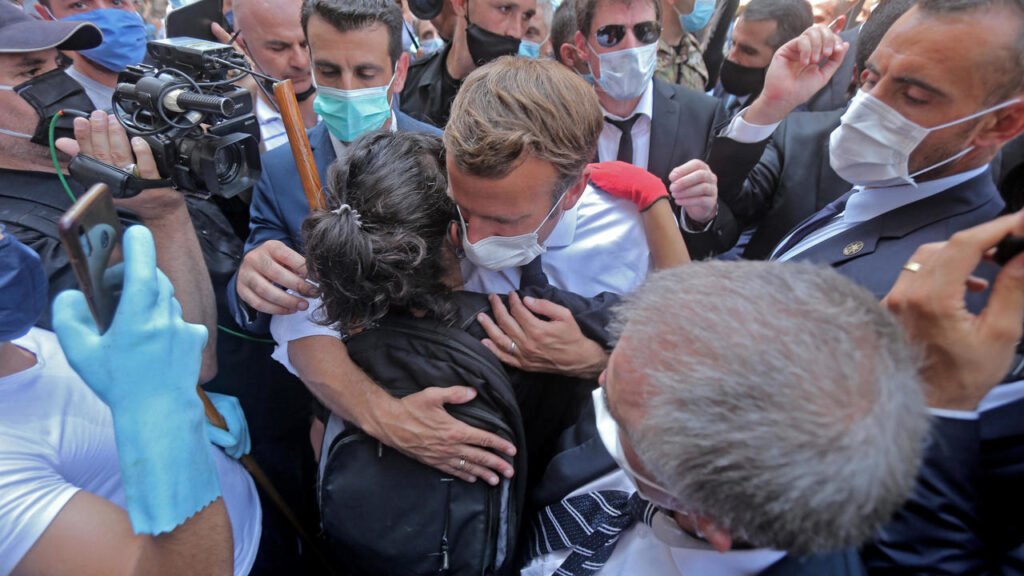
However, most of these messages are meant less for the Lebanese people than for their political protégées and to Ankara. Macron hardly arrived when the infamous AVAAZ community groups launched a petition to place Lebanon under the French mandate for ten years.

Shocking as it may be, Macron indeed did his best to show himself as the only capable person to unite Lebanon, which would collapse without him in the squabbling. It was him, who first openly mentioned that “Lebanon needs a New National Pact”, which is a good point, but casually oversteps that it was France, which introduced this system the last time oppressed Lebanon.
The response, of course, could not wait much, and on 8 August a Turkish delegation lead by Vice President Fuat Oktay and Foreign Minister Mevlüt Çavuşoğlu arrived in Beirut and got a cheerful welcome. The message was almost the same, promising Turkey will solve Lebanon’s problem, also forgetting that the country has less than ideal memories of the Turkish past and the Turkish economy is also at the brink of collapse.
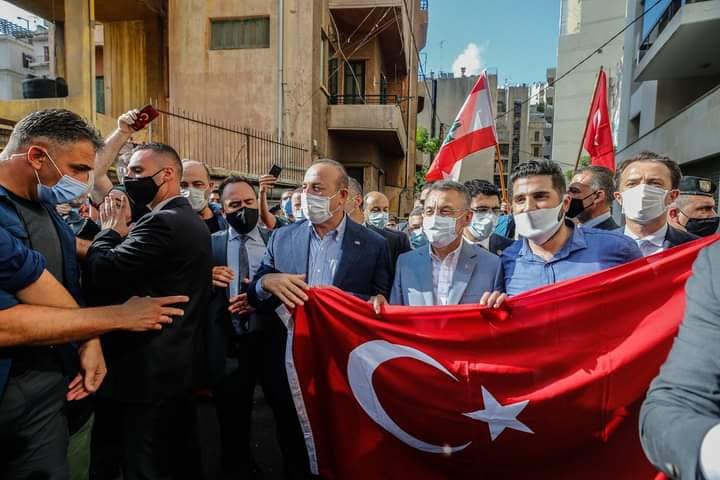
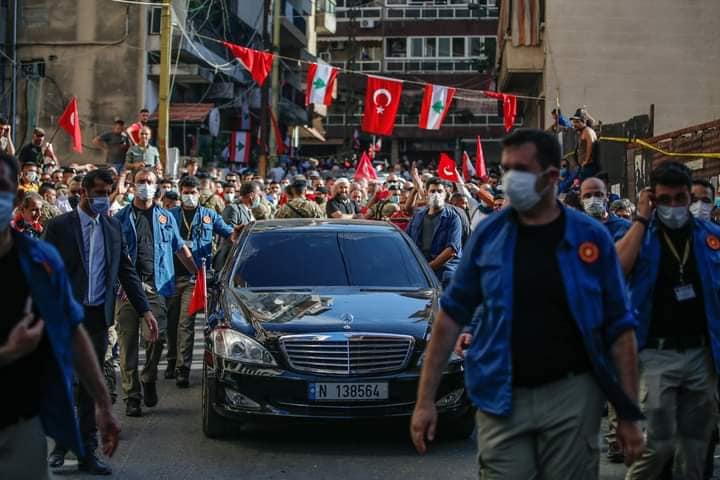
It is sadly clear that shock hasn’t even subset and the tragedy is already exploited in the race for Lebanon. In which the interest of the people, once again, is the most repeated, but the least important point. But these agenda, which by now clearly threaten the sovereignty of the state, manifest in the internal fronts as well.
The rivaling bids
While the foreign interests are probably going to be the key deciding factor in their battle for the future, the reaction of the main political parties is important, as they deal with the people directly. And now, obviously, the people are very ready to make history. But also ready to be exploited.
Sa‘ad al-Ḥarīrī and his allies are the easiest to understand. Their influence completely diminished during the last months, though it was expected that no government would stay alive without him. Now with his involvement in the port, he logically runs ahead, and poses with Macron, as he can be the one, who has his personal connections can bring solutions to Lebanon. Either he is responsible for the tragedy, or not, he has to run ahead and offer himself as the next possible caretaker. That is why he is suggesting an international investigation, knowing that it will last forever with no results, only scandals, and discreetly supports the idea of foreign oversight for some time.
President ‘Awn has a different battle to fight. He tries to stay in control of the state, which is now a careful balance. He cannot refuse international support head-on, even though he clearly understands the risks, but does not want to surrender himself to Macron, or others, knowing ghat he would soon be replaced. That is why he suggested that the accident might have been caused by a foreign power, that investigation should be done swiftly, but he refused an international investigation, as it will just waste time. Which is true, but his real concern is the foreign intrusion.
And finally, there is Ḥizb Allah. From the beginning, all Saudi and Western sources pointed to Ḥizb Allah as its weapons transfer caused the catastrophe. There is no proof of that at all, quite the contrary. This topic was touched more than a year ago by Ḥizb Allah leader denying any such accusation and in his last speech held on 7 August that was repeated, saying “we might know more about the port of Haifa than the port of Beirut”.
But beyond the denial, what path the party chooses to ease the anger? Knowing that the previous government was toppled to break Ḥizb Allah, and the present one also faced huge pressure to cut all ties with the party. Ḥasan Naṣr Allah’s suggestion was that the Lebanese army should conduct the investigation, as the only national institution still trusted by the people. Though indirectly, this way Ḥizb Allah also suggested any foreign investigation, which would be a covert occupation. Previously it also refused the Western economic takeover and suggested a shift to the East, meaning Iran, and China.
Clearly between the contradicting regional and internal agendas the tragedy, whether it was staged, or was just an accident, is yet just another chapter in the struggle, and unlikely to be a game-changer.
Is that so unique?
Truly what happened is Beirut is shocking. But the West or the global public opinion has not much right to mock Lebanon much for what happened. Not only for being responsible for the creation of the very system that enabled the tragedy but because there are some incredible cases of negligence around the world as well, also jeopardizing a huge amount of people.
The infamous tragedy of Chernobyl in the Soviet Union is a well-known story, which claimed the life of 49 people directly, and possibly much more in the following decades. That is still the biggest nuclear incident in the world, but it is less widely circulated that it was not malfunctioning, but a series of human errors caused the tragedy. A safety drill trying to solve a possible emergency measure shortcoming, executed with horrific mistakes, and partially with an inexperienced crew caused the accident. Which was even made worse with the lies and futile coverup of the Soviet government.
While this is a known case with some obscure details, until 2013 the most stunning American incident, the Goldsboro crash of 1961 was largely classified. 1961 an American B-52 bomber armed with 2 nuclear bombs was carrying out a drill and an areal refueling, when malfunction forced the plane to land and it crashed. Both bombs were released and one was very close from blowing up.
Indeed a government leaving tons of highly explosive materials in the middle of the capital without attendance does not deserve much credit. But is a government playing drills on a nuclear plant with changing and inexperienced crew or another flying around with armed nuclear bombs above the country deserve any better? Probably not. These examples show that while the American people believed the official story, and to a large extent even the Soviet population willing to make sacrifices to handle the tragedy, the Lebanese have no faith in their government. The conditions of these accidents are not all that different, but the reception is.
“Hang them!”
On 8 August, following the events, the day before the angry crowds attacked the government offices and took over the foreign ministry. Such wrath is completely understandable, especially in light of the former protests. At this point, the people don’t really have much to do in a smashed city, nor much to fear of. However, in general, the security forces were still able to control the situation, and in time it is expected that control will return.
It is not the violence what is the most shocking, which with dozens of injured already claimed the life of a member of the internal security. The grim prospect is that the most common theme for that night’s protests was: “Hang them”.
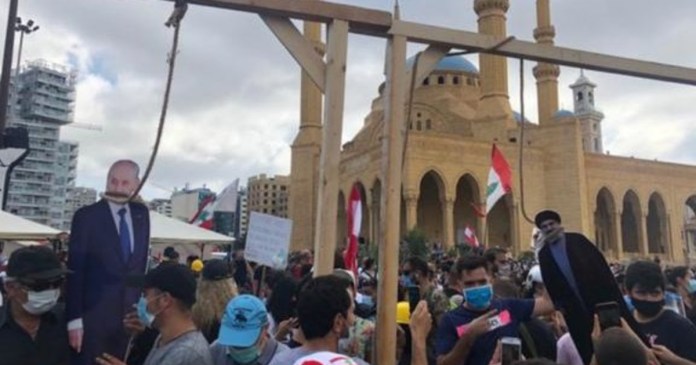
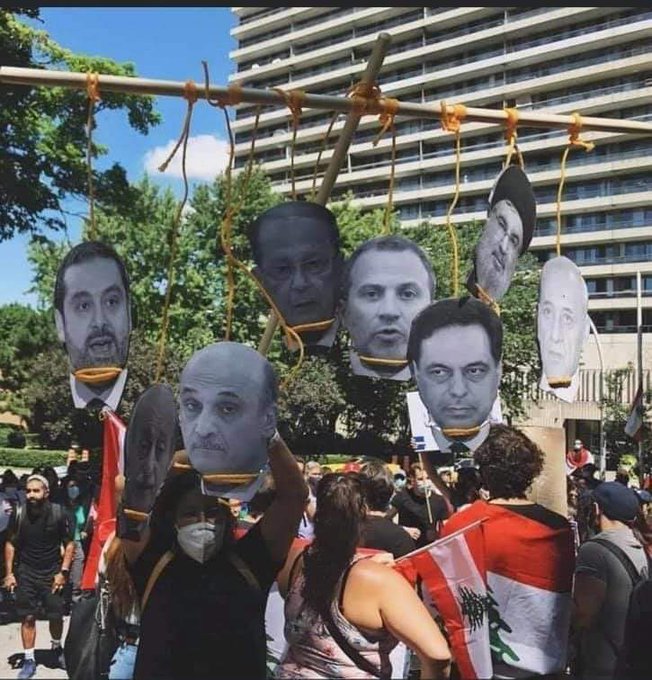
That could have been a sign of grief and anger, but in a country with a history of civil war like Lebanon has, this is much more menacing. Especially that according to the most circulated reports the dummies “hanged” were almost exclusively modeled after the members of this government and the leader of Ḥizb Allah, while the latter still has the biggest support amongst the politicians. Thought Sa‘ad al-Ḥarīrī dummies were also hanged, but the fact that it is not shown and that the American embassy fuels the aggression shows that grief and angers is already channeled along political interests.
It is not surprising to see many would, and probably soon will interpret these as signs of a plot. The political-public discourse clearly hasn’t changed and fueling this hatred. Regardless of what really happened, if this does not stop and in such a climate more and more conspiracy legends will start to circulate the state as a whole will disappear. Then civil war will start again, and truly there is regional demand for such a scenario.
In light of all this we offer our deepest condolences for the lives lost! We pray for Lebanon!

